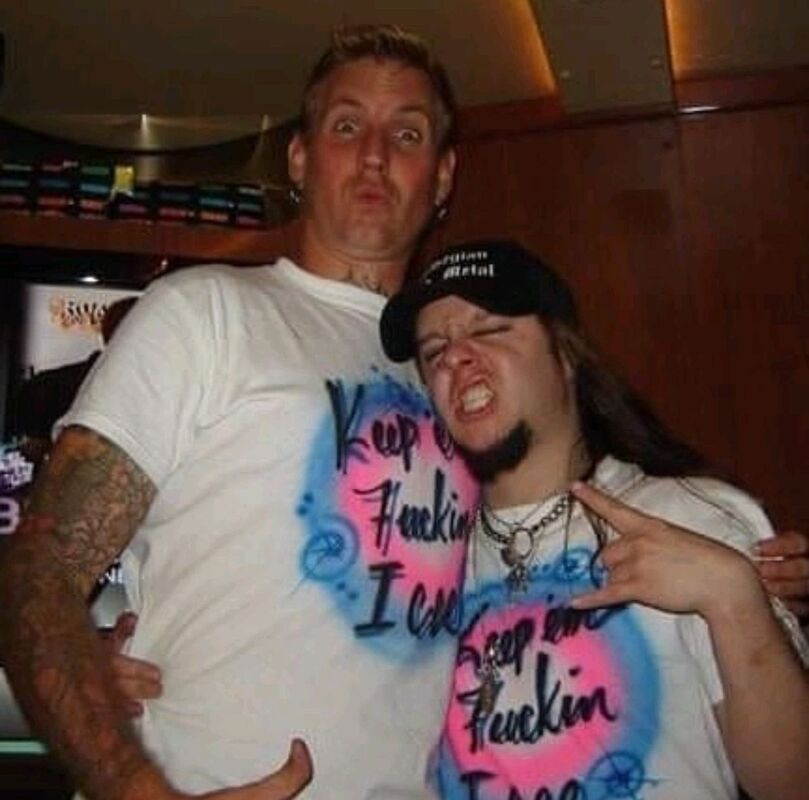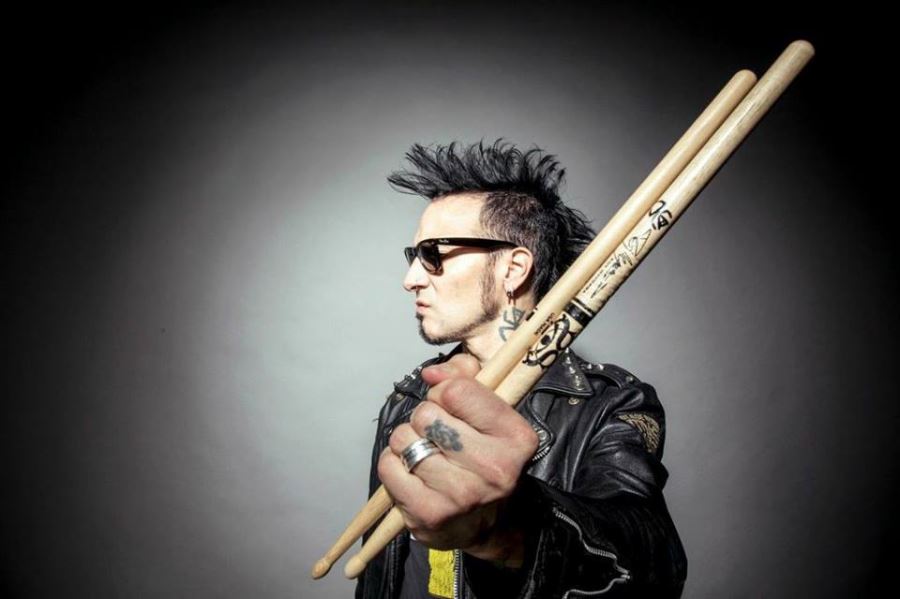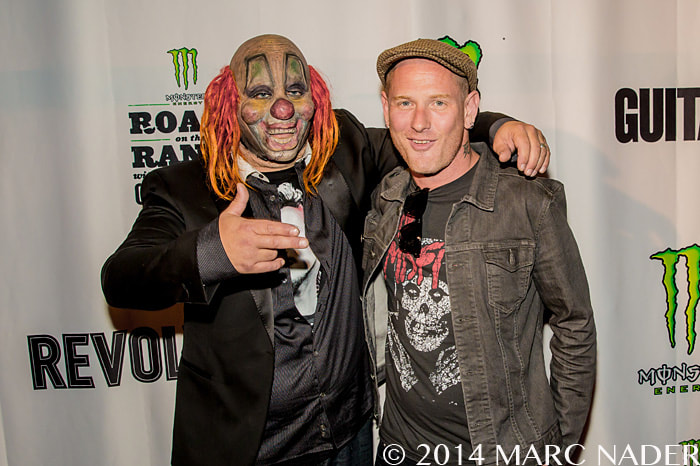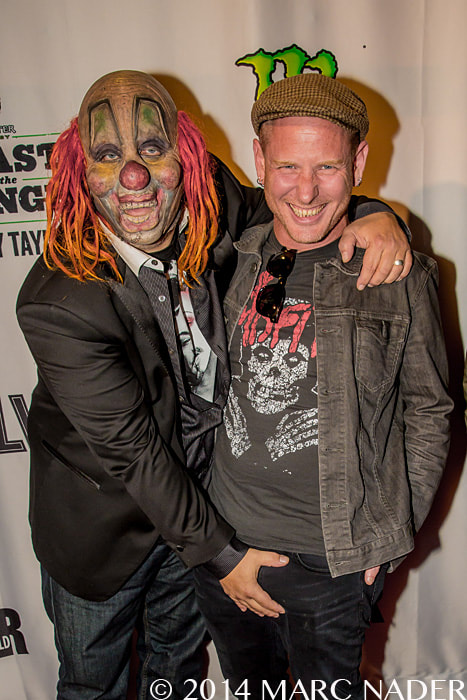[This article/interview was posted to MusicRadar by Rich Chamberlain on December 27th, 2021 | Photo from FamousFix]
“Any chance I get to say some nice words about my friend Joey, I’ll do it,” Brann Dailor tells us as we begin a transatlantic call discussing the legacy of Joey Jordison. Jordison, whose passing this summer shocked the drum world, has been a close friend to Dailor for many years and even, as Dailor himself describes, a ‘cheerleader’ for the Mastodon man.
“You got the sense that his band would be bigger than your band but he was so excited to meet you and talk about what you’re doing,” Dailor recalls. “He would always be on side of the stage drumming along.”
From becoming fans of each other from afar to sharing stages the world over, Dailor and Jordison became great friends, and here the ridiculously-talented prog metal king pays tribute to his buddy Joey.
What was your first exposure to Joey?
“I first heard Slipknot in the late ‘90s. I was playing in a band called Today’s The Day. I was living in Massachusetts and I was working a menial construction job. It was on the way home from work we had the radio on and Slipknot came on.
"I thought it was extremely heavy and was like, ‘What station is this?!’ I had never heard anything like that on the radio. I was surprised and kind of excited. I was like, ‘Wow! If this is popular enough to be on regular radio, that is amazing.’
The drums were the first thing that popped out. They were way up in the mix and it was super fast. There were lots of snare rolls, lots of double bass, there was some grindcore. I was like, ‘Man, there’s grindcore on the radio, this is insane.’
"There is a pop, hooky element to Slipknot but nestled between those hooks, you’re being forced to listen to music that I was very unfamiliar with, underground heavy, heavy death metal that was going on at the time.
"I heard some Suffocation influence, some Cannibal Corpse style in between these big pop choruses. I thought, ‘People are getting hoodwinked a little bit, that’s so cool!’ I gravitated towards the drumming because that’s the instrument I usually pay attention to the most, especially when someone is playing like that. I just thought the dude was rippin’ it.
"They got pretty big pretty fast so they were suddenly on the cover of every magazine around. I didn’t have a computer at this time so music magazines were the way I heard about new music. They were unavoidable.
"They were such a welcome change from what was going on. They had the masks, the costumes, the spectacle of it all. I think music was hungry for it, hungry for something other than four dudes [laughs]. They had clowns, this wild horror aspect to it that was intriguing. You want that on your magazine cover; that’s going to sell magazines! They had all this craziness, it was wild. I wanted to find out more about them, for sure."
When did you first meet Joey?
“I didn’t meet Joey until a few years later. Mick was the first member of the band that I met. We played in Des Moines at this small club and a couple of guys from Slipknot were there.
“I remember Mick bought us a pizza and we hung out at the bar eating pizza after the show. I didn’t meet Joey until 2004 or 2005 when we toured with them in Europe. We toured with Slipknot and Slayer.”
What was your reaction to seeing Joey play live for the first time?
“I was familiar with lots of drummers who rip and when they play live they do their thing and Joey was one of those. He was the same age as me and I could tell from just hearing him play that we came from the same kind of background.
"Seeing Joey live for the first time, seeing Slipknot live for the first time, it was like, ‘Oh, this is the KISS for the new generation.’ It was exactly what live music needed. I felt like my band, we’re not that, we don’t do that. We’re just jeans, t-shirts, we’re up there, our setlist is written in magic marker on a paper plate and we just let her rip. It’s different.
“Over the years we’ve upped our game in terms of live production but at that time I could see those guys had this really cool thing and so much imagination went into their show and I know Joey was a big part of that.
“I was locked in on Joey when I watched them. I wanted to see all of that happen live. Watching Joey was like watching a firework show. He was this little ball of energy that never stopped. That continued after the show and he was like that before the show, he was bouncing off the walls all of the time. He was a lot of fun to hang out with.”
What was it about Joey that so many people connected with?
“Joey inspired people with his personality and then there was the mask and the mystique. There’s something about a smaller statured person, you kind of want to snuggle them, you want to pick them up like, ‘Hey buddy!’
“He just had a very lovable quality about him. He was a loving guy. You’d see him he’d give you a kiss on the forehead and would be so excited to see you. I think that translated to the fans. He would be signing stuff out there with fans for hours.
“He was this little guy but he was larger than life. I think people respond to that. The way he was able to play and what he was able to do behind the kit made him seem ten feet tall but he was this little dude and people are attracted to that.
“His playing, he was this total player. He made people want to pick up the sticks and emulate his playing. Especially for someone who is younger, you hear that and think you have all this energy and don’t know what the hell to do with it and if you could play drums like Joey then that would be something to channel it into.
“It just sounds like pure adrenaline. Then he’s doing windmills with his hair; he was a performer. He was always a performer. That didn’t stop when he got offstage, he was still performing and trying to make people laugh. He was a funny dude.”
You had a close friendship…
“We were really close friends, I don’t know if people know that, we were close right to the end. We would text all the time and talk on the phone. He was just a huge music fan and very knowledgeable about every genre of music, every album, every person who played on the album.
“He was so excited to see anybody play. He was just a fan who happened to be in a band that got really huge so he got those opportunities to be at all of these shows and go backstage and play with Metallica, hang out with Dave Lombardo, he wanted to know everything about all of these guys who had been a big part of his childhood and were his heroes.
“He always had questions for me and other players about learning things they were doing so that he could become a better player. He had no idea he was in this massive band, he just didn’t want to disappoint his fans, be the best player he could be and he was super humble. I feel like I grew up with him.
“He feels like a headbanger who I went to high school with, just a cool guy who loved Metallica and Slayer hanging out together outside of a Mini Mart until 2AM smoking cigarettes and listening to Overkill on a boom box.
“He stayed that person. He stayed a fan, he was the same person that those kids who were fans of his were. He knew he was the same as them so he treated them the way he would want to be treated by a band he idolised. He was always cognisant of that; that’s not the case with some people. That’s the way to do it.”
“Any chance I get to say some nice words about my friend Joey, I’ll do it,” Brann Dailor tells us as we begin a transatlantic call discussing the legacy of Joey Jordison. Jordison, whose passing this summer shocked the drum world, has been a close friend to Dailor for many years and even, as Dailor himself describes, a ‘cheerleader’ for the Mastodon man.
“You got the sense that his band would be bigger than your band but he was so excited to meet you and talk about what you’re doing,” Dailor recalls. “He would always be on side of the stage drumming along.”
From becoming fans of each other from afar to sharing stages the world over, Dailor and Jordison became great friends, and here the ridiculously-talented prog metal king pays tribute to his buddy Joey.
What was your first exposure to Joey?
“I first heard Slipknot in the late ‘90s. I was playing in a band called Today’s The Day. I was living in Massachusetts and I was working a menial construction job. It was on the way home from work we had the radio on and Slipknot came on.
"I thought it was extremely heavy and was like, ‘What station is this?!’ I had never heard anything like that on the radio. I was surprised and kind of excited. I was like, ‘Wow! If this is popular enough to be on regular radio, that is amazing.’
The drums were the first thing that popped out. They were way up in the mix and it was super fast. There were lots of snare rolls, lots of double bass, there was some grindcore. I was like, ‘Man, there’s grindcore on the radio, this is insane.’
"There is a pop, hooky element to Slipknot but nestled between those hooks, you’re being forced to listen to music that I was very unfamiliar with, underground heavy, heavy death metal that was going on at the time.
"I heard some Suffocation influence, some Cannibal Corpse style in between these big pop choruses. I thought, ‘People are getting hoodwinked a little bit, that’s so cool!’ I gravitated towards the drumming because that’s the instrument I usually pay attention to the most, especially when someone is playing like that. I just thought the dude was rippin’ it.
"They got pretty big pretty fast so they were suddenly on the cover of every magazine around. I didn’t have a computer at this time so music magazines were the way I heard about new music. They were unavoidable.
"They were such a welcome change from what was going on. They had the masks, the costumes, the spectacle of it all. I think music was hungry for it, hungry for something other than four dudes [laughs]. They had clowns, this wild horror aspect to it that was intriguing. You want that on your magazine cover; that’s going to sell magazines! They had all this craziness, it was wild. I wanted to find out more about them, for sure."
When did you first meet Joey?
“I didn’t meet Joey until a few years later. Mick was the first member of the band that I met. We played in Des Moines at this small club and a couple of guys from Slipknot were there.
“I remember Mick bought us a pizza and we hung out at the bar eating pizza after the show. I didn’t meet Joey until 2004 or 2005 when we toured with them in Europe. We toured with Slipknot and Slayer.”
What was your reaction to seeing Joey play live for the first time?
“I was familiar with lots of drummers who rip and when they play live they do their thing and Joey was one of those. He was the same age as me and I could tell from just hearing him play that we came from the same kind of background.
"Seeing Joey live for the first time, seeing Slipknot live for the first time, it was like, ‘Oh, this is the KISS for the new generation.’ It was exactly what live music needed. I felt like my band, we’re not that, we don’t do that. We’re just jeans, t-shirts, we’re up there, our setlist is written in magic marker on a paper plate and we just let her rip. It’s different.
“Over the years we’ve upped our game in terms of live production but at that time I could see those guys had this really cool thing and so much imagination went into their show and I know Joey was a big part of that.
“I was locked in on Joey when I watched them. I wanted to see all of that happen live. Watching Joey was like watching a firework show. He was this little ball of energy that never stopped. That continued after the show and he was like that before the show, he was bouncing off the walls all of the time. He was a lot of fun to hang out with.”
What was it about Joey that so many people connected with?
“Joey inspired people with his personality and then there was the mask and the mystique. There’s something about a smaller statured person, you kind of want to snuggle them, you want to pick them up like, ‘Hey buddy!’
“He just had a very lovable quality about him. He was a loving guy. You’d see him he’d give you a kiss on the forehead and would be so excited to see you. I think that translated to the fans. He would be signing stuff out there with fans for hours.
“He was this little guy but he was larger than life. I think people respond to that. The way he was able to play and what he was able to do behind the kit made him seem ten feet tall but he was this little dude and people are attracted to that.
“His playing, he was this total player. He made people want to pick up the sticks and emulate his playing. Especially for someone who is younger, you hear that and think you have all this energy and don’t know what the hell to do with it and if you could play drums like Joey then that would be something to channel it into.
“It just sounds like pure adrenaline. Then he’s doing windmills with his hair; he was a performer. He was always a performer. That didn’t stop when he got offstage, he was still performing and trying to make people laugh. He was a funny dude.”
You had a close friendship…
“We were really close friends, I don’t know if people know that, we were close right to the end. We would text all the time and talk on the phone. He was just a huge music fan and very knowledgeable about every genre of music, every album, every person who played on the album.
“He was so excited to see anybody play. He was just a fan who happened to be in a band that got really huge so he got those opportunities to be at all of these shows and go backstage and play with Metallica, hang out with Dave Lombardo, he wanted to know everything about all of these guys who had been a big part of his childhood and were his heroes.
“He always had questions for me and other players about learning things they were doing so that he could become a better player. He had no idea he was in this massive band, he just didn’t want to disappoint his fans, be the best player he could be and he was super humble. I feel like I grew up with him.
“He feels like a headbanger who I went to high school with, just a cool guy who loved Metallica and Slayer hanging out together outside of a Mini Mart until 2AM smoking cigarettes and listening to Overkill on a boom box.
“He stayed that person. He stayed a fan, he was the same person that those kids who were fans of his were. He knew he was the same as them so he treated them the way he would want to be treated by a band he idolised. He was always cognisant of that; that’s not the case with some people. That’s the way to do it.”





 RSS Feed
RSS Feed
